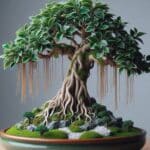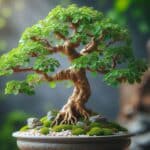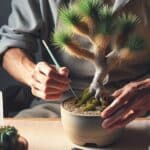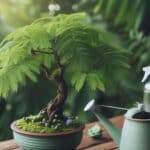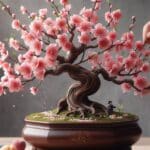Did you know that plants tend to use the nutrients that are available in the soil to make their food?
This doesn’t mean that all of a sudden you are going to see a nutrient appear on the soil and your plant will eat it! But your plant is so incredibly smart that she will produce almost everything she needs to thrive.
If you think about it, a normal tree is capable of extending its roots and expanding themselves in order to look for nutrients. But bonsai trees are not able to do this mainly because they are often repotted into a smaller container, so, what can you do to help them?
For starters, you could fertilize them regularly, especially during their growing season, and this way you will make sure your bonsai will not only survive but will also thrive.
However, you must pay attention to how you do this, as you could easily damage or even kill your bonsai trees.
And don’t worry if you are new in the bonsai world, or if this is your first time gardening and taking care of a plant. Even though fertilization could be seen as difficult (and to some people it can be intimidating) this article will guide you thoroughly.
So, here you will discover everything you need to know about bonsai fertilizers, what are the best types, how to apply them, and how to take care of your bonsai tree. Continue reading and find out everything you need to know about using fertilizer to grow and care for your bonsai.
Understanding The Basics of Bonsai Fertilizers
One of the great things about bonsai trees is that they tend to adapt easily to their surroundings if you take care of them.
So, they don’t really need a special tree fertilizer that will be solely used on them. On the contrary, you could use the same plant food you are using for your other plants (if you have any, of course).
Fertilizers are usually considered as an external source of nutrients that are basic for plants and their development. Fertilizers contain healthy ingredients (sort of speak) that will help your plant grow correctly.
But you must look into something else when you are taking care of a bonsai tree because they need three main nutrients which are: nitrogen, phosphates, and potash. And what do they do? Nitrogen will make your bonsai’s stems and leaves become healthy and strong.
Phosphate will feed the roots and will make sure they are strong. Lastly, potash will protect your bonsai against fungal disease, which is great especially if you live in areas where it’s damp or where you need to have extra help and resistance to boost your bonsai’s defenses and to fight against fungal diseases.
Types Of Bonsai Fertilizers
Many individuals often get confused by the available fertilizers that they can find in their local nursery or shop. But, did you know that bonsai fertilizers are just regular plant fertilizers?
This means that these types of fertilizers are not made from special ingredients that are solely for bonsai trees, on the contrary, they can be used in all of your bonsai plants!
If you have the right fertilizer then its ratio of NPK (which stands for nitrogen, phosphates, and potash) should be equal and this will make your bonsai grow healthy.
Liquid Form of The Fertilizer
You could purchase a liquid fertilizer for your bonsai, and this is often sold as a concentrated fertilizer, so, before using it, you will also need to make a mixture of fertilizer and water as it needs to be diluted because it could be really strong. When you are ready to apply it then you need to put it onto the moistened soil of your bonsai pot.
Depending on the type of bonsai you have, you will need to reapply these liquid fertilizers every two to three weeks. However, some types of bonsai trees will only require a fertilizer application once a month.
Even though you should always apply the fertilizer onto the roots, some people tend to spray the leaves as well, because some nutrients could also be absorbed through the foliage. Make sure your bonsai’s leaves are not completely damp as this could have negative effects.
Solid Form of The Fertilizer
You could buy a solid form of fertilizer for your bonsai. Usually, this type of fertilizer is made of bonsai fertilizer pellets, granules, or powder and you will need to place it right below the surface of the soil in order to make your bonsai absorb all the necessary nutrients.
Slowly, your bonsai will take whatever it needs and they will steadily have a constant supply of nutrients, so you don’t have to worry about fertilizing your bonsai every two weeks or every month.
You must be aware of something though, sometimes having a solid fertilizer can also mean that your tree will have a different odor, and, as a result, it can also attract more pests.
So, on the one hand, it’s a great alternative if you cannot be fertilizing all the time, but on the other hand, it has some aesthetic consequences as well and you must take this into consideration.
What Type of Fertilizer Should I Use?
It all depends on what you feel comfortable with and how much you are willing to do for your bonsai tree to grow healthily.
You must come to terms with the fact that growing a bonsai tree means more than just having and taking care of a miniature tree, because you will also need to pay close attention to their shape, the possible pests that can appear, to your fertilizer, and how you arrange and train your tree.
If you are always busy and don’t have enough time then try the solid fertilizer. If, on the other hand, you would like your fertilizer to work almost immediately then try the liquid version.
Frequently Asked Questions about Bonsai Fertilizers
Here are some of the most asked questions about bonsai trees and its fertilizers:
When Should I Fertilize My Bonsai Trees?
Whenever you feel comfortable and happy to do it! Seriously, if you think about it, every time you are taking care of or maintaining your bonsai you should be in a peaceful or at least righteous state of mind, so don’t do it if you are angry as your tree will absorb all of this negativity!
You could start your fertilization journey a couple of weeks after you repot your bonsai, or as soon as the foliage starts to appear. Either way, you must notice when your bonsai starts changing and growing, and this will help you determine when it’s a good time to fertilize it.
You should have a fertilizing schedule. This means that you should take notes of when and at what time you are feeding your bonsai tree, especially if you tend to forget these things a lot (some people are known for watering their plants twice a day because they can’t remember whether they did it or not!).
So, from early spring throughout late summer, you should constantly feed your bonsai tree. Once you notice your bonsai is not growing anymore then you could then stop fertilizing it.
Depending on the bonsai tree you have, you could fertilize it: weekly, every two weeks, monthly, or every other month. If you have an old tree then you shouldn’t fertilize it that often.
Lastly, if you have an indoor tree then you could fertilize it every week, it will all depend on the type of tree you have.
When Not To Fertilize a Bonsai?
There are times when you shouldn’t fertilize your bonsai tree at all. For example, you should never do it if your tree is under stress or if your tree is dying.
In addition, you should avoid fertilizing your tree if it’s under dormancy or if you are only just repotting it into a different pot. In fact, you should only start fertilizing when a month has passed by, this way you will make sure your bonsai is adapting easily to its new environment.
How Do I Fertilize My Bonsai Tree?
You should always read the recommendations that are stated on the fertilizer’s packaging, or you should ask the seller at the nursery. And remember, try not to overfeed your bonsai trees or they could suffer real damage!
Useful Tips For Fertilizing and Caring For Your Bonsai Tree
Here are some of the most useful tips for fertilizing your bonsai tree:
- Try to understand how your fertilizer works and how you should apply it, otherwise, you could damage or burn the roots of your bonsai. So, if you are in doubt, it’s better to under fertilize it than over-fertilize it!.
- Dormant and sick bonsai trees should not be fertilized.
- Understand what your tree species is before buying and applying the fertilizer because different species will have different needs.
- Always fertilize your plant when you are in the right state of mind.
- Young trees will need more help to grow, therefore, they will also need more fertilizer. The contrary occurs as well, older trees will need less fertilizer, especially when you are no longer training them.
- You should never apply the fertilizer onto the dry soil. So, you must always water your tree before fertilizing.
FAQs
How often should you fertilize a bonsai tree?
The frequency of fertilizing a bonsai tree depends on factors such as the species of the tree, the type of fertilizer used, and the growing conditions. In general, bonsai trees are fertilized every 2-4 weeks during the growing season, which is typically spring through fall.
How do you make bonsai fertilizer?
You can make bonsai fertilizer by combining ingredients such as fish emulsion, seaweed extract, compost tea, and liquid kelp. These organic ingredients provide essential nutrients for bonsai trees and promote healthy root growth.
Do bonsai trees need special fertilizer?
Bonsai trees benefit from specialized bonsai fertilizer that is formulated to provide the right balance of nutrients in a form that is easily absorbed by the tree. These fertilizers often have a balanced NPK ratio (nitrogen, phosphorus, and potassium) suitable for bonsai cultivation.
What happens if you over fertilize a bonsai?
Over-fertilizing a bonsai tree can lead to fertilizer burn, root damage, or nutrient imbalances, which can harm the tree’s health and appearance. Symptoms of over-fertilization may include yellowing or browning of leaves, wilting, or stunted bonsai growth. It’s important to follow the recommended guidelines for fertilizing bonsai trees and avoid applying excessive amounts of fertilizer.
Conclusion
See how easy it is to fertilize your bonsai tree? There’s no doubt about how important it is to apply some fertilizers to your bonsai, especially if you are training it if you would like them to become stronger, and if you really want to take care of them.
You will have to find and determine what type of fertilizer works best for you, what your budget is, and how to do it. I would definitely recommend an organic fertilizer (as organic and natural as it can be), this way you will not be applying hard chemicals onto the soil of your bonsai tree.
By applying a fertilizer, you are making sure that the optimum level of salt and other nutrients is being met. Therefore, you are allowing and helping your bonsai tree to grow better, even if you are fertilizing the soil, not the tree. Bonsai enthusiasts understand the importance of proper care and nourishment to cultivate these miniature masterpieces .
*Photo by photography33/depositphotos



